Related Research Articles
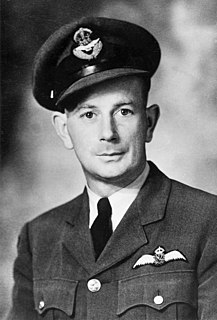
Flying Officer Lloyd Allan Trigg VC DFC, of Houhora, New Zealand, was a pilot in the RNZAF during World War II. He was a posthumous recipient of the Victoria Cross, the highest award for gallantry in the face of the enemy for British and Commonwealth armed forces, and received the award for pressing home an attack on a German U-boat in August 1943. He was killed in the action. His award is unique, as it was awarded on evidence solely provided by the enemy, for an action in which there were no surviving Allied witnesses to corroborate his gallantry.
Awards and Decorations of Nazi Germany were military, political and civilian decorations that were bestowed between 1923 and 1945, first by the Nazi Party and later the state of Nazi Germany.

The Gold Lifesaving Medal and Silver Lifesaving Medal are U.S. decorations issued by the United States Coast Guard. The awards were established by Act of Congress, 20 June 1874; later authorized by 14 U.S.C. § 500. These decorations are two of the oldest medals in the United States and were originally established at the Department of Treasury as Lifesaving Medals First and Second Class. The Department of the Treasury initially gave the award, but today the United States Coast Guard awards it through the Department of Homeland Security. They are not classified as military decorations, and may be awarded to any person.

The Royal Humane Society is a British charity which promotes lifesaving intervention. It was founded in England in 1774 as the Society for the Recovery of Persons Apparently Drowned, for the purpose of rendering first aid in cases of near drowning.
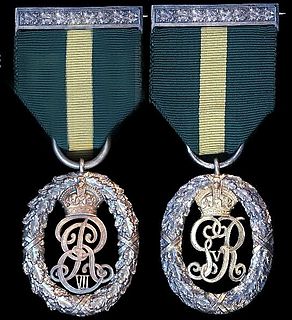
The Territorial Decoration (TD) was a military medal of the United Kingdom awarded for long service in the Territorial Force and its successor, the Territorial Army. This award superseded the Volunteer Officer's Decoration when the Territorial Force was formed on 1 April 1908, following the enactment of the Territorial and Reserve Forces Act 1907, which was a large reorganisation of the old Volunteer Army and the remaining units of militia and Yeomanry. However, the Militia were transferred to the Special Reserve rather than becoming part of the Territorial Force. A recipient of this award is entitled to use the letters "TD" after their name (post-nominal).
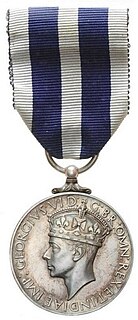
The Queen's Police Medal (QPM) is awarded to police in the United Kingdom for gallantry or distinguished service. It was also formerly awarded within the wider British Empire, including Commonwealth countries, most of which now have their own honours systems. The medal was established on 7 July 1909 as the King's Police Medal (KPM), initially inspired by the need to recognise the gallantry of the police officers involved in the Tottenham Outrage. Renamed the King's Police and Fire Services Medal (KPFSM) in 1940, it was replaced on 19 May 1954 by the Queen's Police Medal (QPM), when a separate Queen's Fire Service Medal was also instituted.

The Albert Medal for Lifesaving was a British medal awarded to recognize the saving of life. It has since been replaced by the George Cross.
The Lloyd's War Medal for Bravery at Sea is one of the four Lloyd's Medal types bestowed by Lloyd's of London. In 1939, with the coming of the Second World War, Lloyd's set up a committee to find means of honouring seafarers who performed acts of exceptional courage at sea, and this resulted in the announcement on 27 December 1940 of the "Lloyd’s War Medal for Bravery at Sea".
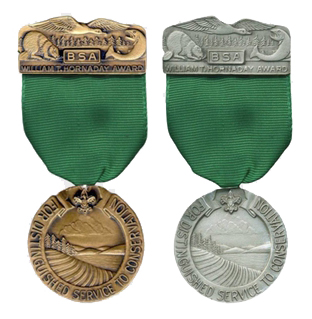
The William T. Hornaday Awards were a series of awards presented by the Boy Scouts of America for service in conservation and ecology. The program is designed to encourage learning about natural resource conservation and the environment, teach sound stewardship of the natural resources and the environment, and recognize those who are outstanding in this field. Considered to be the highest service award a youth could earn in the Boy Scouts, it was a rare and highly prized medal, with only 1,200 medals being awarded in its more than 100 year history. In an effort to distance itself from the controversial history of Dr. Hornaday, the Boy Scouts of America formally retired the William T. Hornaday awards in October of 2020, creating the Distinguished Conservation Service Award in its place.

The Meritorious Service Medal (MSM) is a British medal awarded to sergeants and warrant officers of the British armed forces for long and meritorious service. From 1916 to 1928, eligibility was extended to cover both valuable services by selected other ranks irrespective of length of service, and for gallantry not in the face of the enemy.

The Sea Gallantry Medal (SGM), is a United Kingdom award for civil gallantry at sea.
A rescue lifeboat is a boat rescue craft which is used to attend a vessel in distress, or its survivors, to rescue crew and passengers. It can be hand pulled, sail powered or powered by an engine. Lifeboats may be rigid, inflatable or rigid-inflatable combination-hulled vessels.

The Chicamacomico Life-Saving Station is a former station of the United States Life-Saving Service and United States Coast Guard. It is located in Rodanthe, North Carolina, on Hatteras Island in the Outer Banks, on the east side of what is today Highway 12. Today, the surviving buildings of the station form a museum.
The Badge of Honour, accompanied by the Queen's Certificate and Badge of Honour, is a civil award previously presented by the governments of British colonies and protectorates, and now by British Overseas Territories, to recognise loyal and valuable service by native chiefs and other non-European dignitaries. The Badge of Honour and Certificate continue to be awarded for meritorious services to the local community of an exceptional or outstanding nature in Gibraltar, the Falkland Islands, the Cayman Islands, Bermuda and St Helena.

RMS Lady Hawkins was a steam turbine ocean liner. She was one of a class of five sister ships popularly known as "Lady Boats" that Cammell Laird of Birkenhead, England built in 1928 and 1929 for the Canadian National Steamship Company. The five vessels were Royal Mail Ships that CN operated from Halifax, Nova Scotia and the Caribbean via Bermuda. In 1942 the German submarine U-66 sank Lady Hawkins in the North Atlantic, killing 251 of the 322 people aboard.
Crown Honours Lists are lists of honours conferred upon citizens of the Commonwealth realms. The awards are presented by or in the name of the reigning monarch, currently Queen Elizabeth II, or her vice-regal representative.
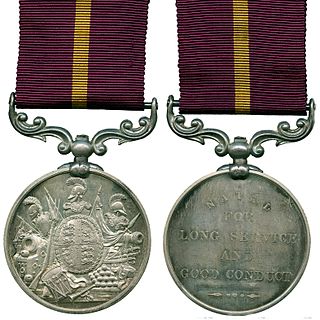
In May 1895, Queen Victoria authorised Colonial governments to adopt various British military medals and to award them to their local military forces. The Colony of Natal introduced this system in August 1895 and, in 1897, instituted the Army Long Service and Good Conduct Medal (Natal).
Edward Quayle was a Manx merchant navy officer who served as commanding officer of numerous Isle of Man Steam Packet Company vessels. Quayle was amongst the first captains of the line, retiring with the rank of Commodore. Captain Quayle was said to have been a thorough seafarer and an attentive and warm-hearted man.

MV Waimarama was a UK refrigerated cargo liner. She was built in Northern Ireland for Shaw, Savill & Albion Line and launched in 1938. She carried perishable foods, particularly meat, from New Zealand to the United Kingdom.
A number of Royal National Lifeboat Institution awards have been established by the Royal National Lifeboat Institution (RNLI) since its creation in 1824. None are approved by the Crown, and are therefore unofficial awards. As such, they do not appear in the official British order of wear, although the principal lifesaving award, the Medal of the RNLI, can be worn on the right breast in uniform by members of the British armed forces.
References
- ↑ "Merchant Seaman Medals" (PDF). National Museums Liverpool. Retrieved 10 September 2019.
{{cite web}}: CS1 maint: url-status (link) - ↑ "Truth About Lloyds". www.truthaboutlloyds.com.